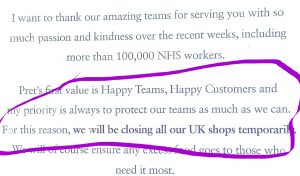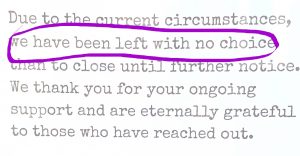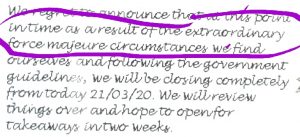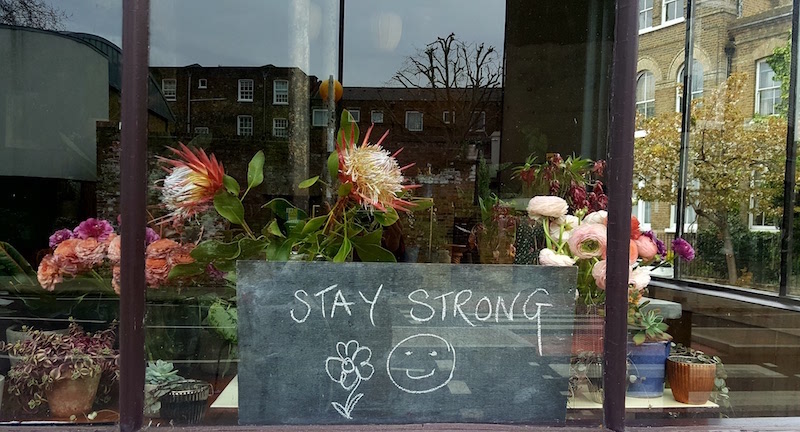As children we were encouraged by our elders not to take words to heart. When we got into squabbles with others our parents and teachers tried to soothe us by saying “sticks and stones may break my bones, but words will never hurt me”.
Or as adults sometimes people dismiss our position with the retort “that’s just semantics”. In both cases the inference is that words don’t matter.
However, as I take my daily walk in the time of the Covid-19 crisis, I’m struck by the closure signs on the doors of retailers, restaurants and pubs. I notice that the choice of words create positivity or negativity. This impacts how I feel and the meaning I make of the message.
In some cases the words engage and inspire me. This manager’s choice of words conveys a sense of “we are all in this together” and a sense of hope that we’ll come through this.
From the following sign I interpret that the manager is guided by values, a bigger purpose and an appreciation for the role the business plays in the community. The words create a greater sense of my customer loyalty. This manager is also the type of leader who I’d like to follow.
In some other cases the words suggest begrudging compliance and victimhood.

Or some managers write as if they have no agency in the situation.

These messages don’t encourage me to rush back when we are no longer in lockdown. Nor would I be inspired to work with this manager.
As I reflect on the choice of words or language, it highlights how important leaders and managers are in setting the appropriate tone with their teams, in creating trust and in inviting innovative responses to challenges.
As one of my teachers, Bob Dunham argues “language is generative, not just descriptive. Language [or a word] has the power to generate action, the outcomes of action, possibilities, commitment, identities, opinions, and much more”. (1)
Think about your own use of language and the impact you have on others and on yourself in your own self talk. I invite you to ask yourself:
- How am I communicating the vision I have for our organisation to my team?
- Have I asked my team for their vision for our organisation? Are we congruent?
- What words do I use to advocate for my proposals or initiatives? Do I tell or do I persuade?
- How am I explaining the need for a reorganisation or redundancies; how am I taking care of my colleagues’ wellbeing in that process?
- How effective am I in providing feedback to my staff; how do I know I’m being effective?
- How successful am I at managing my remote teams; how do I know I’m being effective?
If you’re interested in exploring these and other questions that you may have, I invite you to contact me for a conversation about how we might be a good fit for a coaching partnership, a leadership development workshop or facilitating team meetings. Call me on +44 (0) 7952 068133 or drop me a line sylvana@sylvanacaloni.com. I’d be delighted to explore your challenges with you.
Notes:
- Dunham, R (2009). The generative foundations of action in organizations: Speaking and listening. International Journal of Coaching in Organizations, 7(2), 43-63.
P.S. Since posting this article I have read “A shaken world demands balanced leadership” by Rick Zednik. Whilst the emphasis of his article is more on feminine and masculine styles of leadership, it too points to the importance of the words we use in how we engage with others, invite their collaboration and deal with the complexities of C-19.


Join the discussion One Comment